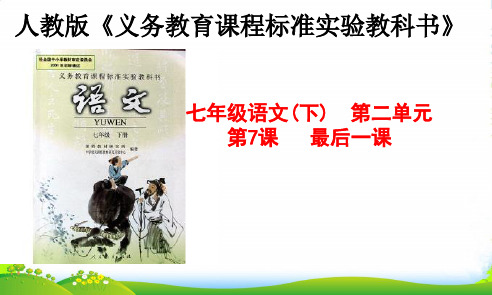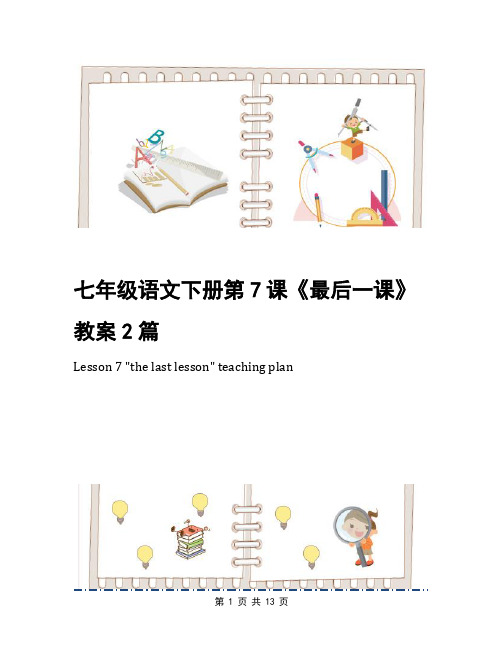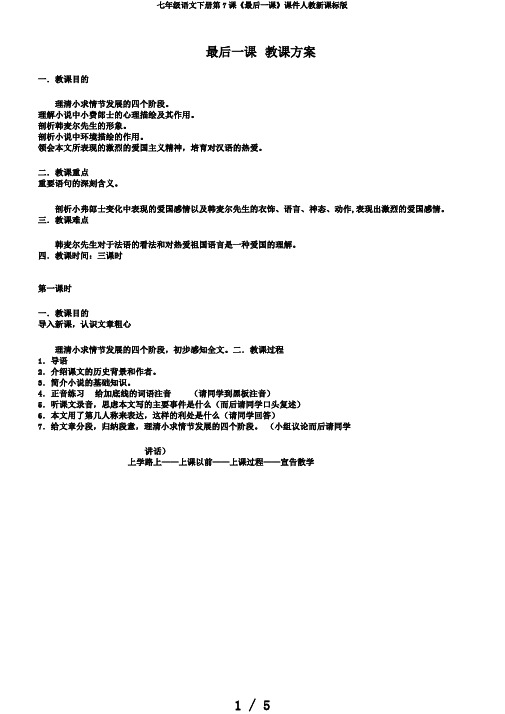第7课时 七年级下册Modules 10—12
人教版语文七年级下册第七课最后一课

有两个原因:
一是迟到会受到韩麦尔先生的批评。
二是怕老师检查功课,自己完成得很不好。“况且”,是连词,进一步说明情况。这两 个原因,促使小弗郎士想逃学。
▪ 看到的是:天气温暖而晴朗,画眉鸟在宛转地歌唱,锯木厂后边的草地上普鲁士士兵在操练, 还有镇公所边的广告牌前围满了人。
分析第二层:上课之前(7—10) 速读第7至10自然段 提问:跑到学校后,小弗郎士发现有哪些情况不同往常?
▪ 不忘祖国语言,就可以激起人民的爱国意识,从而奋起,赶走侵略者,求得民族解放。
牢记民族的语言就有一股强大的凝聚力,就有了信心和力量,就能团结人民,最终打败敌人。
韩麦尔先生是一个
热爱教育事业、热爱祖国语言、有强烈爱国之情的乡村教师。 (恪尽职守,道德高尚 )
环境描写
自然环境:“天气那么暖和,那么晴朗。”
▪ “法兰西万岁”:有两层意思,一是坚信法兰西必胜,激励人民不要忘记自己的祖国;二是韩麦尔 先生爱国主义的集中表现。
巧妙的叙述视角:
▪ 以调皮的男孩作为主人公,通过他稚气的口吻、心理的变化,间接地写出阿尔萨斯地区人民的悲 痛、抗议、对祖国的深情。
▪ 以小弗朗士的视角来叙述韩麦尔先生。
你认为韩麦尔先生是一个怎样的人呢(试结合人物的外貌、语言、神态、动作来分析) ?
按课文内容填空:
①本文的作者 ,他是 国作家.
②本文的体裁是 ③本文以
战争为背,它景的,描三都写要德了素韩是麦尔先生给、法学生上最、后一节。
课的情景,表现了
的
热情.
④第一部分是故事的
,有两个小细说节暗示了“最后一课”的社会背景,请指出:
人物
环境
故事情节
普法
法语
爱国
开端
人教版初中语文七年级下册第7课《最后一课》课件

普鲁士为什么只允许阿尔萨斯和 洛林的学校教德语? 为了让法国人民永远忘记自己是 法国人,做德意志的顺民。 这既是一种野蛮粗暴的文化侵略, 又是对法国人民民族感情的严重 摧残。
―啊,那些坏家伙,他们贴在镇公所布 告牌上的,原来就是这么一回事!”
“那些坏家伙”指谁?
“原来是这么一回事”是什么事?
1. 幼稚; 2. 贪玩; 3. 还能管住自己
阅读“课前”部分
填表说明“最后一课”的异乎寻常
平 气氛 时 最后一课
学生
开始上课的时候,总有 一阵喧闹,在街上也能 听到 开课桌,关课桌,怕吵 捂着耳朵大声背书啦
一切偏安安静静的, 整个教室有一种不平 常的严肃的气氛 同学们都在自己的座 位上了
踱来踱去,胳膊底 下挟着那怕人的戒 尺 有镇上的人
镇长、邮递员前面加上“从前的” 说明了什么?
说明普鲁士在这之前进行了政治和经济 方面的清洗。在军事、政治、经济的侵 略之后,现在进行的是文化侵略。
―老师今天穿上了他那件挺漂亮的绿色礼服, 打着皱边的领结,戴着那顶绣边的小黑丝 帽。……这套衣帽,他只在督学来视察或 者发奖的日子才穿戴。”
韩麦尔先生为什么穿上这套 漂亮的衣服呢?
1.锯木厂后边草地上, 普鲁士兵正在操练。
2.镇公所布告 牌前边,许多 人看布告。
上页
返回
“普鲁士兵正在操练”起什么作用?
•巧妙地交代背景。
•看到普鲁士兵在操练,小弗朗士认 为“比分词用法有趣多了”, 这反映了小弗朗士什么特点?
•这显示出他还幼稚和不懂事,还没 意识到普鲁士军队是侵略者。
从这一段看, 小弗朗士是一个怎样的学生?
品味语言
下列句子有什么作用? 1.有时候一些金甲虫飞进来,但是谁都 不注意。
中考英语 七年级下册 第四讲 Modules7-12复习课件(含11真题) 外研版

on与时间连用时,常与具体的一天或具体某一天的上午、下午、晚上 连用。
It happened on Monday morning. 这件事发生在星期一上午。 【辨析】 at,on与in 三者都是表示时间的介词。 ①at多用于具体的钟点时刻前。 I usually get up at 5:30.我通常在5:30起床。 ②on主要用在星期几,具体的某一天或具体一天的上午、下午、晚上 或节日前。
11.look around 向四周看
12.again and again 再三;反复……
13.go away 走开,离开
14.at the age of 在……岁时
重 点 句 型 整 理
1.She was very friendly. 2.He was born on 18th July,1918. 3.At twentyeight he moved to London and joined a theatre company. 4.How long did you spend there?
I paid 20 yuan for the book.
我买这本书花了二十元钱。
The pen cost me 10 yuan.
这支钢笔花了我十元钱。
Hale Waihona Puke 七年级(下) Modules 7~12 (训练时间:60分钟 分值:100分)
基础知识过关 一、根据首字母及汉语意思写出下列单词(8分) 1.My father is always s____t_r_i_c_t_____with me. 2.The boys were too naughty, they d__e_s_t_r_o_y_e_d_____the teacher's desk and made the teacher very unhappy. 3.In 1994, Mary m__a_r_r_i_e_d______Tom and they are very happy.
人教版七年级语文下册第7课《最后一课》课件

第 二 课 时
学习目标
1、分析小弗郎士和韩麦尔先生的性格特征。 2、分析文中环境描写的作用。探究文章的主旨。 3、学习法国人民强烈的爱国主义精神,培养对祖 国母语的热爱之情。
分析人物形象
自主学习一(20分钟)
1、通读课文,想一想,小弗郎士上课前后心 情、态度有什么变化?什么原因使他发生了 这么大的变化?
旅 行 , 身 体 和 灵 魂 总 要 有 一
三、人生自古谁无死,留取丹心照汗青 事定犹须待阖棺,位卑未敢忘忧国 苟利国家生死以,岂因祸福趋避之 驱除鞑虏,恢复中华
You made my day!
我们,还在路上……
个古 在人 路云 上: 。“ ”读 从万 古卷 至书 今, ,行 学万 习里 和路 旅。 行” 都今 是人 相说 辅: 相“ 成要 的么 两读 件书 事, 。要 。么
作者简介
都德(1840—1897),19世纪法 国著名的现实主义小说家。他的 短篇小说有不少是以普法战争为 题材的,具体生动地描写了法国 普通人民对侵略者同仇敌忾的爱国主义精神,谴 责了资产阶级当局开门揖盗,致使法军节节败退 ,人民陷于水深火热之中的罪恶。《最后一课》 就是都德爱国主义短篇小说的代表作之一。
设置悬念——布告牌上到底写了些什么,为下 面的情节和小弗朗士思想感情的变化埋下伏笔。
探究主旨
自学指导三(5分钟)
“最后一课” 的特殊含义是什么?从中我们可 以体会到哪些情感?
明确:
①最后的教书生涯;
最后的学习自己母语的机会。
②对自己所从事事业的无限依恋之情;对 祖国语言的无比珍视之情;对侵略者的无限 痛恨之情;对祖国的无限热爱之情。
明确:
(1)小弗郎士上课前后的变化: 贪玩不爱学习 → 热爱法语; 怕老师 → 理解同情并敬爱老师; 幼稚不懂事 → 热爱祖国。
初级中学人教版语文七年级下册第7课+最后一课+课件

不但指出文章的内容,而且蕴含着悲愤的情绪,一 定程度上暗示了中心。
3.人物描写(结合课后练习)。
韩麦尔先生--服装、表情、动作、语言。 服装:穿礼服上课表示对最后一课的重视。 表情:柔和、严肃、惨白、呆 语言: 宣布这是最后一堂法语课。“最后……最后……” 评论 法国语言 动作:用尽全身力气书写“法兰西万岁” 总结:韩麦尔先生漂亮的礼服,温和而又严肃的表情,富有哲 理、发人深思的教诲,用尽全身力量写下的“法兰西万岁!”给 人以极深刻的印象。这一切都说明这个普普通通的语言教师的 职业是和祖国的命运紧密连在一起的。因此由他身上所表现出 来的爱国主义精神更典型,更有代表性。
------韩麦尔先生的教育,激发了大家的爱国热情,大家决心 要认真学好和牢记"法兰西" "阿尔萨斯",他们把这看成是祖 国的象征,因此把字帖比成小国旗。习字的时候也特别专心。
------抓住声音和最容易分心的人和事来写。(细节描写)
-------"他们该不会强迫这些鸽子也用德国话唱歌吧!"小弗
郎士嘲笑普鲁士侵略者强迫人民学德语,也表现出一个天真 的孩子对侵略者无所不至的暴行的愤慨。
总结
从第11-23节是《最后一课》中心部分,着 重写韩麦尔先生以自己对祖国无限热爱的心情 上好最后一课,以及小弗郎士激发了爱国热情, 从一个天真、贪玩的孩子转变成为一个懂事的 学生,专心上好最后一课的情景。 四、布置作业 完成练习二、六及预习研讨练习五。
第三课时 [教学要点]
1.讲读第24-29节,归纳本文的中心。 2.了解作者是如何通过平凡的材料表现 重大主题的。
4、小弗郎士没能答出分词的用法,老师说了 什么?由此可看出他的心情是怎样的?
------"总要把学习拖到明天,这正是阿尔萨斯人最 大的不幸"、"算了吧,时间有的是,明天再学也不 迟"。先生批评阿尔萨斯人不珍惜时光学习,结果 连自己的语言也不会说、不会 写,而今又失去了学 习自己祖国语言的权利,表现先生的民族责任感和 爱国热情。
七年级语文下册第7课《最后一课》ppt课件

普法战争的起因、经过和结果,以及法国在战争中的表现 和影响。
类似题材文学作品推荐阅读
《最后一课》与爱国主义情怀
推荐阅读《少年维特之烦恼》、《钢铁是怎样炼成的》等具有爱国主义情怀的文学作品, 引导学生理解不同国家、不同时代背景下人们的爱国情感表达方式。
《最后一课》与教育主题
推荐阅读《爱的教育》、《窗边的小豆豆》等以教育为主题的文学作品,让学生思考教育 的意义和价值,以及如何在教育中培养爱国情怀。
02 文本解读与赏析
情节梳理:四部分结构概述
第一部分:背景介绍 与课堂情境描绘
交代小弗朗士迟到的 原因,展现其内心的 懊悔与自责。
描述普法战争背景, 展现课堂庄重、严肃 的氛围。
情节梳理:四部分结构概述
第二部分:小弗朗士的心理变 化过程
从最初的茫然、不解到逐渐意 识到最后一课的非凡意义。
描写小弗朗士对法语、对老师 的情感变化,展现其心灵成长 的历程。
《最后一课》与战争题材
推荐阅读《战争与和平》、《永别了,武器》等战争题材的文学作品,让学生了解战争对 人类的摧残和破坏,以及如何在战争中坚守人性和尊严。
05 思考题引导与课堂互动环 节
针对课文内容提出问题,引导学生思考讨论
1 2
问题1
《最后一课》中的主人公小弗朗士在最后一课上 有哪些转变?这些转变对他的人生观和价值观产 生了怎样的影响?
创作背景
基于普法战争后阿尔萨斯-洛林地 区的真实情况,通过一堂法语课 的场景,展现了当地居民对母语
和民族文化的热爱与坚守。
主题意义
表达了作者对民族语言和文化的珍 视,以及对侵略战争的控诉和对民 族尊严的呼唤。
艺术特色
通过生动的细节描写和人物塑造, 将一堂普通的法语课升华为民族精 神的象征,具有强烈的感染力和思 想深度。
七年级语文下册第7课《最后一课》教案2篇

七年级语文下册第7课《最后一课》教案2篇Lesson 7 "the last lesson" teaching plan七年级语文下册第7课《最后一课》教案2篇前言:语文是基础教育课程体系中的一门重点教学科目,其教学的内容是语言文化,其运行的形式也是语言文化。
语文能力是学习其他学科和科学的基础,也是一门重要的人文社会科学,是人们相互交流思想等的工具。
本教案根据语文课程标准的要求和教学对象的特点,将教学诸要素有序安排,确定合适的教学方案的设想和计划、并以启迪发展学生智力为根本目的。
便于学习和使用,本文档下载后内容可按需编辑修改及打印。
本文简要目录如下:【下载该文档后使用Word打开,按住键盘Ctrl键且鼠标单击目录内容即可跳转到对应篇章】1、篇章1:最后一课范文(标准版)2、篇章2:最后一课样本(通用版)篇章1:最后一课范文(标准版)教学目标:知识和能力目标:识记并理解“哽、宛转、惩罚、祈祷、懊悔”等词语的音、形、义;结合课文了解文章的时代背景。
过程和方法目标:整体把握,通过人物的心理、语言及动作,理解人物思想感情;学习文章“以小见大”的写法。
情感态度和价值观目标:体味文中深沉的爱国情怀,珍惜现在时光,抓紧时间学好本领,为祖国的腾飞作出应有的贡献。
教学重点1.心理描写对人物思想感情的作用。
2.文中表现的强烈的爱国主义精神。
教学难点:韩麦尔先生关于法语的见解和结尾动作描写所包含的思想感情。
教学时间:两课时教具准备:多媒体课件教学过程:第一课时教学内容:串讲课文内容教学步骤:一、导入新课有这样一句话:“失去了,才觉得珍贵。
”体会一下,你们有没有这样的感觉?可今天我们要见到一位小学生,他应该有更深的体会。
过去的他是一个非常贪玩的人,但突然有一天被宣布从此不能再学习母语了,他似乎一下子警醒了,“学习是多么重要!”可这失去的又无法挽回了。
因此,在他的“最后一课”中他想了很多,也学到了很多……二、简介课文背景(多媒体课件展示)1870年7月爆发的普法战争是法国发动的。
浙江省2018届中考英语总复习 第1部分 教材知识梳理篇 第7课时 七下 Modules 10-12(精讲)试题 外研版

第7课时七年级下册Modules 10-12,基础知识巩固温馨提示:建议在掌握重点单词、短语及句型后,趁热打铁,完成《默写手册》P12-13对应内容,以达到巩固、自测的效果。
续表,重难词句选析1.arrive v. 到达(教材P62)【辨析】arrive,reach与get to(1)arrive是不及物动词,后接地点名词时,须在其后接上介词in或at。
arrive in表示到达大地方,arrive at表示到达小地方。
如:They will arrive in Hong Kong tomorrow morning.他们将在明天上午抵达香港。
(2)reach是及物动词,其后直接接宾语。
如:He reached Shanghai last month.他上个月到的上海。
(3)get to是固定短语,意为“到达”,其后常接地点名词作宾语。
若后接地点副词,则要省略介词to。
如:I got home just now.我刚到家。
【即时训练】从方框中选择恰当的单词填空。
arrive,get,reach(1)The Browns will __arrive__ at a small village this afternoon.(2)Although it rained heavily,she __got____to the top of the mountain successfully.(3)I want to know when you __reached____home yesterday evening.2.sound n. 声音(教材P72)【辨析】sound,voice与noise三者都可以表示“声音”,其区别在于:sound泛指自然界的一切声音;voice指人的嗓音或说话、唱歌的声音;noise指令人不愉快的噪音。
如:Light travels faster than sound.光传播的速度比声音快。
七年级语文下册《第7课 最后一课》课件 新人教版PPT

读最后一个部分,讨论:
1、文中“转 ”、“拿”、“ 写” 等一连串的动词 表现了韩麦尔先生怎样的思想感情?
表现了他的痛苦心理,倾注了他对祖国的爱、 对敌人的恨。
2、找出表现他内心极度悲痛的词语,简要分析它 的表达作用?
“脸色惨白”、“他哽住了”。写出了他对 敌人强烈的愤恨和对国土丧失的悲痛心情。 表现了他强烈的爱国感情。
《最后一课》就反映这一事件。
都德
法国作家
他的短篇小说 《最后一课》和 《。柏林之围》成 为爱国主义名篇
小说是一种通过人物、情节 和环境的具体描写来反映现实 生活的文学体裁。
人物 小说的中心 (典型)
三
自然环境
要 素
环境
(具体)
社会环境
情节: (序幕)、开端、发展、 (完整) 高潮、结局、(尾声)
3.韩麦尔先生的衣着与往常不同。
4.镇上有很多人来听课,但个个很忧虑。
这四个方面的不同渲染了最后一课的 气氛,描写人们爱国的具体行动,点 明最后一课引起了学生、老师以及镇 上人们的强烈震动和他们对最后一课 的无限珍惜,也为小弗郎士的思想转 变提供了条件。
1.小弗郞士在最后一课的课堂上, 思想感情发生了什么变化?变化 的原因是什么?
(tiē)妥帖 (jiàng)倔强
想一想,回答
“最后一课” 上的是一堂什 么课?这堂课 的特殊含义是 什么?
标题的含义和作用
含义:亡了国的阿尔萨斯人最后一堂 法语课。
作用:这标题不但指出文章的内容, 而且蕴含着肃穆的气氛和悲愤的情绪, 一定程度上暗示了中心。
小弗郎士在“最后一课”中的见闻感受
贪玩、不用功、不懂事, 但有一定的自控力。
在上学路上,小弗郎士看到的情景(操练、布 告牌)对全文内容起什么作用?
七年级语文下册 第7课《最后一课》备课助教资料 人教新课标版

第7课《最后一课》备课助教资料课文研讨一、整体把握这是一篇脍炙人口的短篇小说。
由于其主题表现的深刻与艺术手法的生动,被许多国家选进课本,作为中小学生接受爱国主义教育、了解法国文学的教材。
小说重点写法国阿尔萨斯地区被德国普鲁士军队占领以后,侵略者强迫当地学校改教德语的事件。
最后一课,是一个具有特殊意义的典型环境,因为从此以后学校里不许再教法语了,小孩从此要学习异国统治者的语言,接受异国文化。
这是侵略者在军事强占以后进行的文化侵略。
作者在这里把一个小学校里的一堂课的意义提高到向祖国告别的高度,使这一堂课的任何场景、细节都具有了庄严的意义。
小说在艺术上有两个值得特别注意的地方。
一是巧妙的叙述视角。
作品的主题十分严肃,但对这一主题的表现却选用了一个巧妙的角度。
作品原来还有一个副标题是“阿尔萨斯省的一个小孩子的自述”。
作者选择一个淘气调皮的男孩作为主人公,通过他带着些无知而稚气的口吻,以他心理的变化,间接地写阿尔萨斯地区人民由衷的悲痛和对侵略者无声的抗议,表现出他们对祖国的恋恋深情。
小主人公在这堂课里受到了前所未有的教育,读者也受到了感动。
二是生动的人物、场景、细节、心理描写。
小说精心运用了大量描写,表现人们在最后一课上的种种反应,其中着墨最重的是韩麦尔先生。
例如细节描写。
这篇小说的许多细节描写是十分耐人寻味的。
就拿作者描写屋顶上鸽子咕咕低叫这一细节来说,它使小弗郎士提出一个幽默的问题:“他们该不会强迫这些鸽子也用德国话唱歌吧!”旋即文笔骤收,戛然而止。
答案,就留给读者去思索、补充。
又如韩麦尔的那顶“绣边的小黑丝帽”,郝叟老头的那本“初级读本”,和那副横放在书上面的大眼镜,不待说给人留下深刻的印象。
还有作品中前后两次出现的普鲁士军队的操练和军号声,教室里飞进的几个金龟子,黑板上书写的“法兰西万岁”几个大字,这些细节看来是信手拈来,实际上却并非可有可无,它们起着烘托环境气氛、刻画人物性格和揭示主题思想的作用。
初一下册Modules 1012 课文挖空和重点短语学案-最新教学文档

Module10 A holiday journey重点短语:1.on holiday 度假2.drive sb to 载某人去......3.such as 例如4.take a walk 散步5.do some shopping 购物6.first of all 首先Unit1 what did you do?Lingling: Where are you going on holiday, Tony?Tony: To Los Angeles.Betty: Oh, really? You’ll love it! I went there two years ago and enjoyed ______ a lot.Tony: ______ ______ did it take to get there? Did you fly?Betty: Yes, we did, and that _______ about nine hours. Then our friends met us and drove us to ______ home.Lingling: Who was ______ you?Betty: My parents.Lingling: So what did you do?Betty: Well, first, we went to Disneyland, and guess what? I met Snow White and Mickey Mouse! I was so ______ (excite)!Tony: Wow! How long did you stay there?Betty: We stayed there for two days. And then we went to Hollywood.Lingling: Did you see any movie starts?Betty: No, ______ we swam in the Pacific Ocean at Santa Monica. It was great! Lingling: Where are you going ______ _______ this year, Betty?Betty: Paris.It; How long; took; with; excited; but; on holidayUnit2 This morning we took a walk .Hi, Grandma! Here I m in Paris. Jenny and I arrived ______ plane the day before yesterday. Aunt Joan and Uncle Peter met us at the airport. We were tired so we relaxed at home and began our tour of the city yesterday.Yesterday we went to the Louvre Museum. It has many world-famous works of art, _____ _____ the Mona Lisa. In the evening we had dinner in a French restaurant. The food was delicious!This morning we took a walk. There are shops, and restaurants everywhere, and I love the street and markets. They sell such good fruit and vegetables. We also did some shopping. I bought a present ______ you. I hope you’ll like it!At about three o’clock, we ______ the Paris Underground to the Eiffel Tower. It is really high. There were lots of tourists, so first of all, we had to ______ in line for ______ hour, and then we went to the top. We waited till all the lights were on. It was wonderful!Tomorrow we’re going to visit a famous palace and take a boat tour on the River Seine. I’ll write again.Love,Berryby; such as; for; took; wait; an;Module 11 Body language重点短语:1.nod heads 点头2.shake hands 握手3.personal space 私人空间4.how about 那么5.arm in arm 手挽手6.look at 看着7.not at all 完全不Unit 1 They touch noses!Lingling: We’re going to have some Russian teachers at school tomorrow, and I’m welcoming the ______. How do I do that?Betty: Lingling, you know, in Russia, people usually kiss three times, left, right, left.Lingling: What! No, I didn’t know that. We Chinese often ______ ______ and smile when we meet visitors, and sometimes we ______ our heads . But we______ kiss. Only parents and children do that.Betty: That’s ________ people do ________ things in different countries. Lingling: So what do people in the US usually do ______ they meet?Betty: In the US some people shake hands, and some kiss or hug ______ ______.In India people put ______ hands together and nod their heads. And doyour know ______Maori people in New Zealand do when they meet? Lingling: No, What do they do?Betty: They touch noses!visitors; shake hands; nod; never; because; different; when; each other; their; whatUnit2 Here are some ways to welcome them.Body language around the worldby Wang Lingling Our new foreign students are going to arrive very soon, and here are some ways to welcome ______.How close do you stand when you talk to a friend? You can stand too close to people in the Middle East but don’t stand too close to North American! Give them more _______ space._______ ________ touching people? Chinese girls often walk______ ______ ______ with their friends. South American sometimes hold your arm when they talk to you, so you can’t move away! But in Britain many people don’t like other people to touch them at all.Do you look at people when you talk? In some places, it isn’t ______ to look at people when they talk, but in other countries it isn’t polite to look somewhere ______. In Britain and the US, people usually look at ______ _______ when they talk.And ______ do you say goodbye? That’s easy, wave to say goodbye. But becareful! In Greece, it’s not at all polite! In fact, it’s very rude!them; personal; How about; arm in arm; polite;Module 12 Western music重点短语:hear sb. do / doing sth. 听见某人做某事t ake…around… 带领…参观…take place 发生not only…but also…不但…而且…hundreds of 成百上千Unit 1 It’s so beautiful!(The Blue Danube)Daming: Hmm, this is Western music, isn’t it? Can you hear the violin and the piano?It’s so beautiful! Is this ______Strauss or Mozart?Lingling: I’m not _______…Betty:It’s by Strauss. I love his music! Do you know anything _______ him, Tony?Tony: Was he German?Betty: No, he was _______ in Vienna, the capital of Austria. _______ a beautiful city! This is ________ The Blue Danube. The Danube is a river in Europe.It goes ________ Vienna.Lingling: Do you like both? You listen to pop music, Betty?Betty: Well, I like both. You listen to pop music, Lingling ,______ _______? Lingling: Yes, I do. I also like Beijing opera. Listen to this fantastic voice.Tony: Hmm, the sound is very … different, isn’t it? I’m a fan of rock music.Listen to this!Daming: Hey! Give us a break!Lingling: Rock music? Listen to those drums.Daming: It’s so _______! And much too fast!Tony: You don’t like rock music? I don’t ________ it!by; sure; about; born; What; called; through; don’t you; noisy; believeUnit 2 Vienna is the centre of European classical music.The city of musicVienna is a beautiful old city on the River Danube in the ______ of Europe. It’s the capital city of Austria and the centre of European classical music. In the eighteenth century a lot of musicians came to study and work in Vienna.In the Strauss family, there were two composers called Johann Strauss: the father and the son. The father, Johann Strauss the elder, wrote and played music for traditional dances, called the waltz. His dance music made him famous ______ ______ Europe. The son, Johann Strauss the younger, was also very successful and popular. He wrote over 150 waltzes. In 1867 he wrote The Blue Danube waltz.Mozart was another very important composer. He was born in Austria ____ 1756. Before he was six, he played ______ ______ the piano _____ ______ the violin. His family ______ him ______ Europe and he gave concerts in many cities. He wrote _______ _____wonderful pieces of music. But he became very poor and died in 1791 when he was only 35. ______ Johann Strauss, father and son, he was a great Europeanmusician, and many people still think his music is perfect.centre; all over; in; not only; but also; took; around; hundreds of; Like。
初一下册Modules 1012 课文挖空和重点短语学案

Module10 A holiday journey重点短语:1.on holiday 度假2.drive to 载某人去......3.such as 例如4.take a walk 散步5.do some shopping 购物6.first of all 首先Unit1 what did you do?Lingling: Where are you going on holiday, Tony?Tony: To Los Angeles.Betty: Oh, really? You’ll love it! I went there two years ago and enjoyed ______ a lot.Tony: ______ ______ did it take to get there? Did you fly?Betty: Yes, we did, and that _______ about nine hours. Then our friends met us and drove us to ______ home.Lingling: Who was ______ you?Betty: My parents.Lingling: So what did you do?Betty: Well, first, we went to Disneyland, and guess what? I met Snow White and Mickey Mouse! I was so ______ (excite)!Tony: Wow! How long did you stay there?Betty: We stayed there for two days. And then we went to Hollywood.Lingling: Did you see any movie starts?Betty: No, ______ we swam in the Pacific Ocean at Santa Monica. It was great! Lingling: Where are you going ______ _______ this year, Betty?Betty: Paris.It; How long; took; with; excited; but; on holidayUnit2 This morning we took a walk .Hi, Grandma! Here I m in Paris. Jenny and I arrived ______ plane the day before yesterday. Aunt Joan and Uncle Peter met us at the airport. We were tired so we relaxed at home and began our tour of the city yesterday.Yesterday we went to the Louvre Museum. It has many world-famous works of art, _____ _____ the Mona Lisa. In the evening we had dinner in a French restaurant. The food was delicious!This morning we took a walk. There are shops, and restaurants everywhere, and I love the street and markets. They sell such good fruit and vegetables. We also did some shopping. I bought a present ______ you. I hope you’ll like it!At about three o’clock, we ______ the Paris Underground to the Eiffel Tower. It is really high. There were lots of tourists, so first of all, we had to ______ in line for ______ hour, and then we went to the top. We waited till all the lights were on. It was wonderful!Tomorrow we’re going to visit a famous palace and take a boat tour on the River Seine. I’ll write again.Love,Berryby; such as; for; took; wait; an;Module 11 Body language重点短语:1.nod heads 点头2.shake hands 握手3.personal space 私人空间4.how about 那么5.arm in arm 手挽手6.look at 看着7.not at all 完全不Unit 1 They touch noses!Lingling: We’re going to have some Russian teachers at school tomorrow, and I’m welcoming the ______. How do I do that?Betty: Lingling, you know, in Russia, people usually kiss three times, left, right, left.Lingling: What! No, I didn’t know that. We Chinese often ______ ______ and smile when we meet visitors, and sometimes we ______ our heads . But we______ kiss. Only parents and children do that.Betty: That’s ________ people do ________ things in different countries. Lingling: So what do people in the US usually do ______ they meet?Betty: In the US some people shake hands, and some kiss or hug ______ ______.In India people put ______ hands together and nod their heads. And doyour know ______Maori people in New Zealand do when they meet? Lingling: No, What do they do?Betty: They touch noses!visitors; shake hands; nod; never; because; different; when; each other; their; whatUnit2 Here are some ways to welcome them.Body language around the worldby Wang Lingling Our new foreign students are going to arrive very soon, and here are some ways to welcome ______.How close do you stand when you talk to a friend? You can stand too close to people in the Middle East but don’t stand too close to North American! Give them more _______ space._______ ________ touching people? Chinese girls often walk______ ______ ______ with their friends. South American sometimes hold your arm when they talk to you, so you can’t move away! But in Britain many people don’t like other people to touch them at all.Do you look at people when you talk? In some places, it isn’t ______ to look at people when they talk, but in other countries it isn’t polite to look somewhere ______. In Britain and the US, people usually look at ______ _______ when they talk.And ______ do you say goodbye? That’s easy, wave to say goodbye. But becareful! In Greece, it’s not at all polite! In fact, it’s very rude!them; personal; How about; arm in arm; polite;Module 12 Western music重点短语:hear . do / doing sth. 听见某人做某事t ake…around… 带领…参观…take place 发生not only…but also…不但…而且…hundreds of 成百上千Unit 1 It’s so beautiful!(The Blue Danube)Daming: Hmm, this is Western music, isn’t it? Can you hear the violin and the piano?It’s so beautiful! Is this ______Strauss or Mozart?Lingling: I’m not _______…Betty:It’s by Strauss. I love his music! Do you know anything _______ him, Tony?Tony: Was he German?Betty: No, he was _______ in Vienna, the capital of Austria. _______ a beautiful city! This is ________ The Blue Danube. The Danube is a river in Europe.It goes ________ Vienna.Lingling: Do you like both? You listen to pop music, Betty?Betty: Well, I like both. You listen to pop music, Lingling ,______ _______? Lingling: Yes, I do. I also like Beijing opera. Listen to this fantastic voice.Tony: Hmm, the sound is very … different, isn’t it? I’m a fan of rock music.Listen to this!Daming: Hey! Give us a break!Lingling: Rock music? Listen to those drums.Daming: It’s s o _______! And much too fast!Tony: You don’t like rock music? I don’t ________ it!by; sure; about; born; What; called; through; don’t you; noisy; believeUnit 2 Vienna is the centre of European classical music.The city of musicVienna is a beautiful old city on the River Danube in the ______ of Europe. It’s the capital city of Austria and the centre of European classical music. In the eighteenth century a lot of musicians came to study and work in Vienna.In the Strauss family, there were two composers called Johann Strauss: the father and the son. The father, Johann Strauss the elder, wrote and played music for traditional dances, called the waltz. His dance music made him famous ______ ______ Europe. The son, Johann Strauss the younger, was also very successful and popular. He wrote over 150 waltzes. In 1867 he wrote The Blue Danube waltz.Mozart was another very important composer. He was born in Austria ____ 1756. Before he was six, he played ______ ______ the piano _____ ______ the violin. His family ______ him ______ Europe and he gave concerts in many cities. He wrote _______ _____wonderful pieces of music. But he became very poor and died in 1791 when he was only 35. ______ Johann Strauss, father and son, he was a great Europeancentre; all over; in; not only; but also; took; around; hundreds of; Like。
七年级语文下册第7课《最后一课》课件人教新课标版

最后一课教课方案一.教课目的理清小求情节发展的四个阶段。
理解小说中小费郎士的心理描绘及其作用。
剖析韩麦尔先生的形象。
剖析小说中环境描绘的作用。
领会本文所表现的激烈的爱国主义精神,培育对汉语的热爱。
二.教课重点重要语句的深刻含义。
剖析小弗郎士变化中表现的爱国感情以及韩麦尔先生的衣饰、语言、神态、动作,表现出激烈的爱国感情。
三.教课难点韩麦尔先生对于法语的看法和对热爱祖国语言是一种爱国的理解。
四.教课时间:三课时第一课时一.教课目的导入新课,认识文章粗心理清小求情节发展的四个阶段,初步感知全文。
二.教课过程1.导语2.介绍课文的历史背景和作者。
3.简介小说的基础知识。
4.正音练习给加底线的词语注音(请同学到黑板注音)5.听课文录音,思虑本文写的主要事件是什么(而后请同学口头复述)6.本文用了第几人称来表达,这样的利处是什么(请同学回答)7.给文章分段,归纳段意,理清小求情节发展的四个阶段。
(小组议论而后请同学讲话)上学路上——上课以前——上课过程——宣告散学三.课后思虑找出每一个阶段中描绘小费郎士心理活动的句子。
第二课时一.教课目的有感情朗诵课文。
理解小说中小费郎士的心理描绘及其作用,剖析小弗郎士变化中表现的爱国感情剖析小说中环境描绘的作用。
二.教课过程回首上节所学重点。
请同学朗诵第一阶段,并找出描绘小费郎士心理活动的句子。
3. “我想就别上学了”的原由有哪些?从这里能够看出“我”是如何的孩子?(请同学讲话)“这些情景”指什么?感觉“比分词用法风趣多了”说了然什么?.领会“又出了什么事啦?”这个句子,在文中有什么作用?请同学朗诵第二阶段,并剖析今日的情况和平常有什么差别?(小组议论)请同学朗诵第三阶段,在最后一课上,小费郎士的思想感情与平常有哪些不一样?(小组议论,而后请同学回答)为何小弗郎士这一节课特别专心听?并且都能听理解?请同学朗诵第四阶段,并剖析作者写钟声和号声有什么作用?(请同学回答).“我感觉他素来没有这么高大”拥有什么表现力量。
七年级语文下册 第二单元 第7课《最后一课》教案 新人教版(2021学年)

七年级语文下册第二单元第7课《最后一课》教案新人教版编辑整理:尊敬的读者朋友们:这里是精品文档编辑中心,本文档内容是由我和我的同事精心编辑整理后发布的,发布之前我们对文中内容进行仔细校对,但是难免会有疏漏的地方,但是任然希望(七年级语文下册第二单元第7课《最后一课》教案新人教版)的内容能够给您的工作和学习带来便利。
同时也真诚的希望收到您的建议和反馈,这将是我们进步的源泉,前进的动力。
本文可编辑可修改,如果觉得对您有帮助请收藏以便随时查阅,最后祝您生活愉快业绩进步,以下为七年级语文下册第二单元第7课《最后一课》教案新人教版的全部内容。
《最后一课》教案【教学目标】知识与能力:1、整体把握文章内容,理清情节结构.2、分析人物形象,品味小说的语言,揣摩人物心理。
3、理解作品内涵,培养爱国情感。
过程与方法:在反复朗读中感悟,培养学生自主合作学习能力。
情感态度与价值观:培养学生对母语和祖国的热爱之情。
【教学重点】1、从小说中的语言、神态、动作、心理等描写入手,分析人物形象2、在分析人物形象过程中体会法国人民的爱国情感。
【教学难点】小说中人物形象的分析。
教学方法:任务驱动法、点拨法。
学法:自主学习、合作交流相结合。
课前准备:布置学生查找作者都德的资料和写作背景,反复朗读课文,结合课后的“研讨与练习”给课文作批注。
课时:1课时教学过程:一、激活兴趣,导入新课一个民族有一个民族的语言一个国家有一个国家的尊严,学习、热爱民族语言,就是维护国家的尊严,是爱国的表现,失去民族语言就等于丧失国土。
如果有一天,有人告诉你,你再也不能学习汉语,每天你挂在嘴边的普通话不能再用了,从今天开始你只能用日语交流,那么你会有怎样的感受呢?(学生发表感言)今天我们就共同学习都德的《最后一课》,体会一下国家被占领,将要失去自己祖国语言的法国人民是什么样的感受。
(板书:最后一课都德)二、出示活动任务1、整体把握文章内容,理清情节结构。
2、分析人物形象,品味小说的语言,揣摩人物心理.3、理解作品内涵,培养爱国情感.三、展示自学,夯实基础1、作者简介阿尔封斯•都德(1840-1897),法国十九世纪著名小说家。
